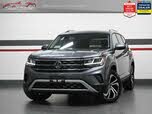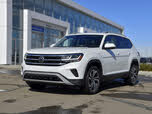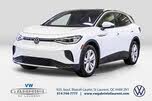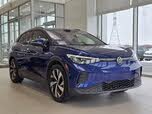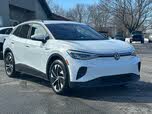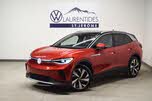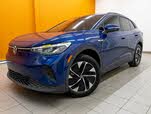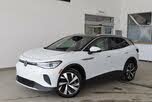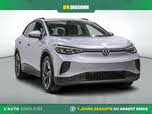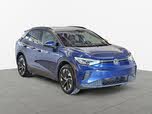2022 Volkswagen Atlas vs 2021 Volkswagen ID.4
Overview | ||
MSRP | $39,995 | $34,335 |
Average price | $31,636 | $39,076 |
Listings | ||
Ratings & Reviews | ||
User reviews | ||
Expert reviews | 7.3 out of 10Read full review | 7.0 out of 10Read full review |
Pros & cons | Pros
| |
Summary | The “Dieselgate” emissions scandal forced Volkswagen to double down on electric cars, and now we’re finally seeing the first result of that: the 2021 Volkswagen ID.4 electric crossover. VW has made an electric car before, but its last attempt, the e-Golf, was built to satisfy emissions standards, not rack up sales. It was barely advertised, and it was sold only in certain locations. With the ID.4, it will launch in the three largest Canadian EV markets—British Columbia, Quebec, and Ontario—and will even be built in North America, in Chattanooga, Tennessee, starting in 2022. Volkswagen views the ID.4 as a rival not to other EVs, but to mainstream gasoline vehicles like the Honda CR-V and Toyota RAV4. Being late to the party means there are already several other EVs trying to coax new-car buyers away from internal combustion, however. If you want a reasonably priced EV, the Nissan Leaf, Hyundai Kona Electric, and Kia Niro EV already exist, and General Motors has the 2022 Chevrolet Bolt EUV—a new variant of the Chevy Bolt EV with a crossover body style similar to the Volkswagen. Our test car was an ID.4 1st Edition, a U.S.-only model released to commemorates the car’s launch. Its closest Canadian equivalent is the ID.4 RWD Pro with the Statement Package. | Until 2018, Volkswagen seemingly ignored the fact that North America wanted roomy, functional SUVs. But that year, a right-sized Tiguan arrived ready to challenge the leaders in the compact SUV class and the family-sized Atlas went on sale to wage war in the three-row SUV segment. Both addressed criticism that Volkswagen was out of touch by going above and beyond with regard to passenger comfort, cargo space, and utility. Now, five years later, the 2022 Volkswagen Atlas is essentially unchanged following a substantial refresh for the 2021 model year. And though the 2022 Atlas remains a study in contrast, it is easy to understand why people buy it. Sometimes, size does matter. |
Video | No video found | |
Popular Features & Specs | ||
Engine | 201 hp Electric | 2.0L 235 hp I4 |
Drive Train | RWD | FWD |
Seating Capacity | 5 | 7 |
Horsepower | 235 hp @ 5400 rpm | |
EV Battery Capacity | 82 kWh | |
MPG City | 104 | 21 |
MPG Highway | 89 | 25 |
Battery Charge Time (240V) | 8 hours | |
Engine | ||
Engine Name | 201 hp Electric | 2.0L 235 hp I4 |
Torque | 258 lb-ft @ 1600 rpm | |
Horsepower | 235 hp @ 5400 rpm | |
Battery Charge Time (240V) | 8 hours | |
Drivetrain | RWD | FWD |
Fuel Economy | ||
EV Battery Capacity | 82 kWh | |
MPG City | 104 | 21 |
MPG Highway | 89 | 25 |
Interior | ||
Seating Capacity | 5 | 7 |
Safety | ||
Front Crash Overall | 5 | 4 |
Side Crash Overall | 5 | 5 |
Dimensions & Capacity | ||
Cargo Space | 30.3 cu ft | 20.6 cu ft |
Curb Weight | 4517 lbs | 4262 lbs |
Height | 64.4 in | 70.1 in |
Length | 180.5 in | 200.7 in |
Width | 72.9 in | 78.4 in |
Wheelbase | 108.9 in | 117.3 in |
Maximum Payload | 1347 lbs | 1102 lbs |
Number of doors | 4 | 4 |
Maximum Towing Capacity | 2000 lbs | |
The 2021 Volkswagen ID.4 was crafted as a distinct electric vehicle, diverging from the traditional styling of Volkswagen's gasoline models. It featured a streamlined profile with wheels positioned at the corners, offering a unique aesthetic compared to the more rugged appearance of the Tiguan and Atlas. The ID.4 was part of Volkswagen's EV-specific MEB platform, following the ID.3 hatchback. While it shared some design elements with the ID.3, the ID.4 aimed to appeal to North American crossover buyers, though its SUV-like styling was subtle. Inside, the ID.4 combined Volkswagen's minimalist design with a tech-focused aesthetic, featuring piano black and matte plastic finishes. The base model included a leather-wrapped steering wheel and cloth seats, with leatherette upholstery available in higher trims.
In contrast, the 2022 Volkswagen Atlas carried over with minor updates from the previous year, offering a bold and boxy design. The Execline trim, the top of the Canadian lineup, featured R-Line design elements and 21-inch alloy wheels, enhancing its upscale appearance. The interior of the Atlas was praised for its simplicity and premium flair, though some materials were criticized for their low-cost feel. Despite its size, the Atlas provided a comfortable and spacious cabin, accommodating seven passengers with ease. The SUV's practicality was further enhanced by its numerous storage areas, although some lacked linings, leading to unwanted noise. Overall, the Atlas offered a more traditional SUV experience with a focus on comfort and space.
The 2021 Volkswagen ID.4 was available in two powertrain configurations. The base rear-wheel drive (RWD) version featured a single rear-mounted electric motor producing 201 horsepower and 229 pound-feet of torque, powered by an 82-kilowatt-hour battery pack. An all-wheel-drive (AWD) version added a second electric motor for a total output of 295 horsepower and 339 lb-ft of torque. The ID.4's RWD setup provided balanced handling, though it was tuned more for comfort than sportiness. The electric motor delivered ample power, with instantaneous torque making acceleration enjoyable. However, the ID.4's regenerative braking system did not allow for one-pedal driving, as Volkswagen aimed to provide a familiar experience for drivers transitioning from gasoline cars.
The 2022 Volkswagen Atlas offered two engine options in Canada. The standard turbocharged 2.0-litre four-cylinder engine produced 235 horsepower and 258 pound-feet of torque, paired with an eight-speed automatic transmission and standard 4Motion all-wheel drive. The turbo-four's towing capacity was limited to 907 kilograms, and it required premium fuel for maximum output. The optional 3.6-litre V6 engine, available on higher trims, delivered 276 horsepower and 266 lb-ft of torque. While the V6 could tow up to 2,268 kilograms, its performance was considered leisurely. The Atlas featured various driving modes and an Active Control system for different conditions, but its ride quality was criticized for being busy and noisy on certain surfaces. Despite its size, the Atlas was easy to maneuver, thanks to its cameras and sensors.
The 2021 Volkswagen ID.4 offered more front and rear headroom than many competitor EVs, though its legroom was average for the segment. It provided 858 litres of cargo space with the rear seats in place and 1,818 litres with them folded, surpassing several electric rivals but falling short of gasoline models like the Honda CR-V and Toyota RAV4. The ID.4 lacked a "frunk" for extra storage, prioritizing cabin space instead. The interior felt spacious, with good forward visibility, though rearward visibility was hindered by thick pillars. The ID.4 featured a unique twist-grip gear selector and standard heated steering wheel and front seats, which proved effective in cold conditions.
The 2022 Volkswagen Atlas excelled in interior space and comfort, seating seven people with ample head and legroom, even in the third row. The SUV's low step-in height made it accessible, and it offered numerous storage areas, though some were unlined. Cargo space was exceptional, with 583 litres behind the third row, 1,572 litres with the third row folded, and 2,741 litres with the second row down. These figures surpassed those of the full-size Nissan Armada. The Atlas's interior featured cloth seats in the base trim, with leatherette and genuine leather available in higher trims, along with a panoramic sunroof and heated second-row seats.
The 2021 Volkswagen ID.4 came with a standard 10-inch touchscreen infotainment system, with an optional 12-inch screen, and wireless Apple CarPlay and Android Auto. A 5.3-inch display served as the instrument cluster, and haptic touchpads replaced traditional controls. While the setup looked modern, it was challenging to use due to the lack of tactile feedback. The ID.4 also featured a natural-language voice-control system and the ID.Light, a light strip that communicated information to the driver. Despite some gimmicky features, the infotainment system was well-designed, with smart graphics and easy-to-navigate menus.
The 2022 Volkswagen Atlas included the Volkswagen Digital Cockpit instrument cluster as standard, with an 8-inch display on lower trims and a 10.25-inch display on higher trims. The Trendline trim had a 6.5-inch touchscreen with basic connectivity features, while other trims featured the MIB3 infotainment system with an 8-inch touchscreen, wireless Apple CarPlay and Android Auto, and more. The Atlas also offered Car-Net connected services and a MyVW smartphone app for remote access. However, the user experience was hindered by slow loading times and a cumbersome process for tuning the radio. The voice recognition system was also hit-and-miss, making smartphone integration a more reliable option.
The 2021 Volkswagen ID.4 received a Top Safety Pick+ rating from the IIHS, with points docked for certain headlights. The NHTSA awarded the RWD version a five-star safety rating, though the AWD version had not been tested. The ID.4 offered a range of driver aids, including forward-collision warning, automatic emergency braking, blind-spot monitoring, and adaptive cruise control. New features like Travel Assist and Emergency Assist were also included, enhancing highway driving and safety.
The 2022 Volkswagen Atlas boasted an extensive list of safety features, including automatic post-collision braking, Front Assist, Side Assist, and Rear Traffic Alert. Higher trims added adaptive cruise control, parking sensors, and advanced lighting systems. The Execline trim featured a surround-view camera system and Park Assist technology. However, the Lane Assist system had issues with old construction markings, and disabling it required navigating through the digital instrumentation. The Atlas's crash-test ratings were decent but not class-leading, with four-star ratings in frontal-impact tests from the NHTSA.
CarGurus highlights

According to CarGurus experts, the overall rating for the 2021 Volkswagen ID.4 is 7.3 out of 10, while the 2022 Volkswagen Atlas scores 7.0 out of 10. Based on these ratings, the 2021 Volkswagen ID.4 is the recommended choice for those seeking a modern electric vehicle with advanced safety features and a tech-savvy interior.
Choose the 2022 Volkswagen Atlas if:
Shop Now- You need a spacious and comfortable SUV with ample seating for seven passengers.
- You require significant cargo capacity for family trips or transporting large items.
- You appreciate a comprehensive suite of safety features and driver assistance technologies.
Choose the 2021 Volkswagen ID.4 if:
Shop Now- You prioritize a modern electric vehicle with a distinctive design and efficient powertrain.
- You value advanced safety features and a high safety rating from the IIHS.
- You prefer a tech-focused interior with wireless smartphone integration.

By: CarGurus + AI
At CarGurus, our team of experienced automotive writers remain at the heart of our content operation, conducting hands-on car tests and writing insightful guides that are backed by years of industry experience. To complement this, we are harnessing AI to make our content offering more diverse and more helpful to shoppers than ever. To achieve this, our AI systems are based exclusively on CarGurus content, ratings and data, so that what we produce is both unique to CarGurus, and uniquely helpful to car shoppers.






















